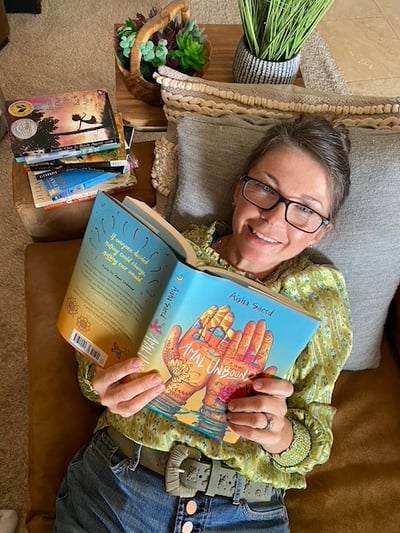Amal Unbound by Aisha Saeed was selected as a mentor text for grade 7 of Emozi® Middle School because it is a story about the love and obligation of family, strength, resilience, resistance, and the power of education. It presents an approachable look into the real-life problem of child labor and educational inequity worldwide.
Overview
Amal Unbound is the story of Amal, a 12-year-old girl who loves to read and dreams of one day becoming a teacher. The novel takes place in a quiet Pakistani village, providing the backdrop for this compelling story's beginning. After her mother gives birth to a 5th daughter, Amal is forced to quit school and stay home to help care for her sisters. An altercation with the son of her corrupt landlord over a pomegranate leads to Amal being forced into indentured servitude to work off her family's debt. This novel is inspired by the real-life story of Malala Yousafzai.
Here are two facts: 1) according to the World Bank, roughly 160 million children are affected by child labor, which is nearly 1 in 10 children worldwide as of 2020, 2) according to Unicef, worldwide, nearly 129 million girls between the ages of 5-17 are not in school. These statistics open up a rich discussion of gender equality and children's rights. I hope you choose to read this book in a Socratic Seminar with your class.
Socratic Seminar questions
Chapter 1
"I knew helping family was what a good eldest daughter did, but this time after school with Miss Sadia wasn't just fun; it was important. I wanted to be a teacher when I grew up, and who better to learn from than the best teacher I ever had?"
- Amal has a goal for her life. What goals do you have? What do you think you might want to do?
Chapter 2
"Our father would be home soon, but she know Omar didn't chime his bicycle bell three times unless it was important."
- Why is it important that Amal's father will be home soon?
- What do we know about Amal at this point?
- What do we know about Amal's village and the people who live there?
Chapter 3
"We had a small collection of books in our class, but it was no secret that the boys' school had a much bigger library to choose from."
"Looking at him, it hit me yet again how unfair it was for God to give me a friend who understood me completely and created him as a boy."
"Amal, I know he's your friend, but you're not a little girl anymore... You can't spend so much time with him."
- From these quotes, what is your impression of how boys are treated and how girls are treated?
- Is Amal disappointed about this? Do you see a difference?
- What are the "rules" for boys and girls in your community? How are they different?
"So now we met in secret to talk, to listen to each other, to laugh."
- Amal and Omar decide to break the rules. Do you think this is a good idea? Why or why not?
 Emozi Grade 7 Lessons for Amal Unbound
Emozi Grade 7 Lessons for Amal Unbound
- Lesson 1: Dealing with Disappointment
- Lesson 2: Stress Reduction
- Lesson 3: Mindfulness
- Lesson 4: Healthy Lifestyles
- Lesson 5: It's Okay to Fail
- Lesson 6: Relationships
- Lesson 7: Resilience
- Lesson 8: Emotional Awareness
- Lesson 9: Being Responsible
- Lesson 10: Forgiving
- Lesson 11: Time Management
- Lesson 12: Community Involvement and Giving Back
For the full Socratic Seminar for this novel and full lesson plans for the topics listed, visit our website for more details on how to get Emozi for your classroom!



